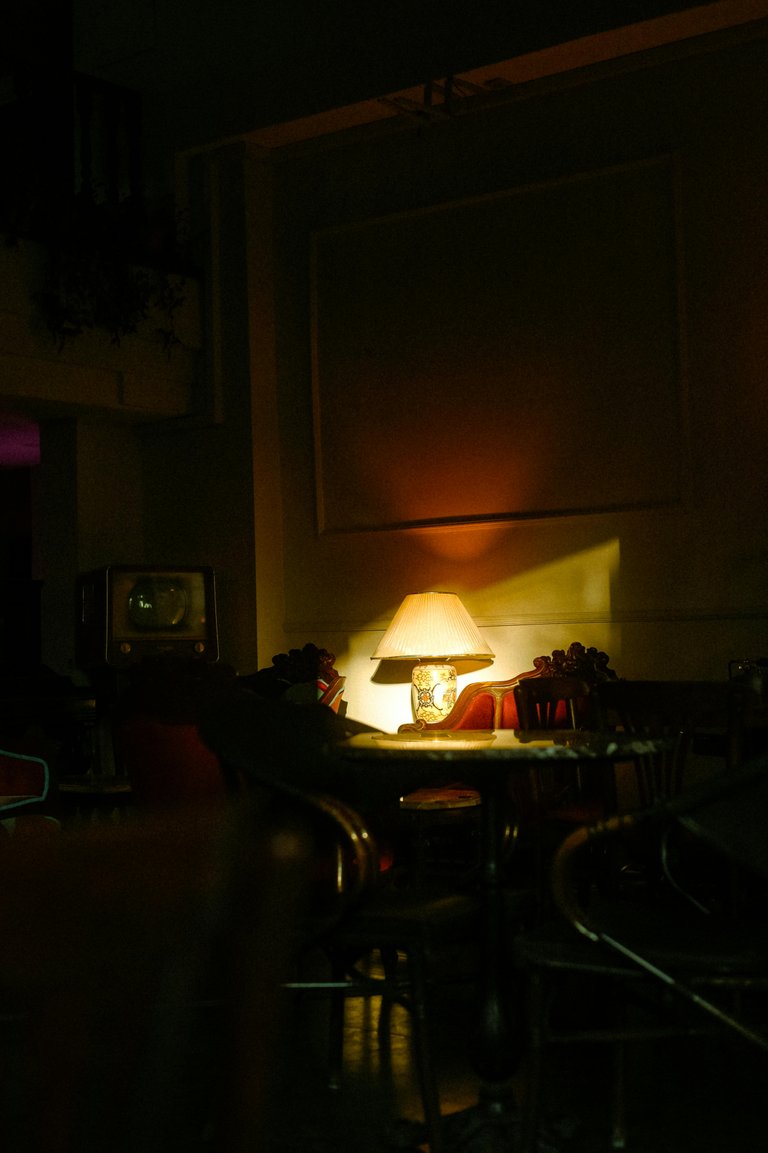El pensamiento es una maravillosa máquina de creación. Una suerte de navecita abstracta piloteada por nuestra conciencia y esta a su vez es una vocecita que intentar decir sin voz que se pueda oír y, sin embargo, allí está; gritando silencios o susurrando gritos, cómo ustedes prefieren. Rubens mira apenas el líquido ambarino en el vaso de vidrio, lo apura castigando su garganta con el fuerte licor, aún no se acostumbra. Estar solo le permite reaccionar con una fea mueca en el rostro ante el golpe del trago. El humo de un malboro rojo se arremolina en sus arrugas de la frente y se eleva hasta las comisuras de las lágrimas de la lámpara que ya debe tener cincuenta años colgando en aquella habitación apenumbrada. Otro sorbo, otra mueca. Su voz interior se pasa en las manecillas del reloj de pared, allí los minutos se deshacen en el péndulo que dibuja lunas en su cansado vaivén. Rubens piensa; aquel ajado sueño trocado en presagio decía que justo aquella noche a las 20:25 pasaría. Destapa la botella, completa el vaso mientras la alfombra de la entrada ahoga el ruido de unos pasos que se aproximan…
Rubens se estremece. La voz interior, antes un murmullo, ahora se torna un coro. Canta una melodía antigua, una nana que no reconoce, pero que le resulta terriblemente familiar. Los pasos se detienen frente a la puerta. El pomo gira. Un hilo de luz se cuela bajo la entreabierta. Él siente un escalofrío que nada tiene que ver con el licor. La puerta se abre lentamente, revelando una figura envuelta en sombras. Una figura que parece familiar, y al mismo tiempo, completamente ajena. La figura se acerca, sus ojos brillan como dos luceros en la oscuridad. Y entonces, el tiempo se detiene. El péndulo se queda suspendido en el aire, el humo del cigarrillo se petrifica. Rubens y la figura se miran fijamente, como si estuvieran atrapados en un cuadro. En ese instante, Rubens comprende que el sueño, el presagio, está a punto de cumplirse.
La figura, con una sonrisa enigmática, extiende una mano. Rubens, hipnotizado, la toma. La mano es cálida, pero también húmeda, como si estuviera empapada. Juntos, se adentran en un túnel sin paredes, un espacio infinito y oscuro. El suelo se convierte en un líquido viscoso que los envuelve. Rubens siente que se hunde, que se desintegra, lo compara con la sensación que lo dominó el día que su esposa lo engañó.
La figura, entre familiar y tenebrosa, lo guía a través de un laberinto de recuerdos, pesadillas y anhelos, mientras ella danza con libertad, Rubens se sumerge más profundamente en alegres emociones, sintiendo cómo su cuerpo se disuelve y se reconfigura.
La figura, ahora una sombra difusa, tararea una melodía y todo se llena de símbolos y jeroglíficos que Rubens no comprende, pero que le resultan cercanos. Al final del túnel, una luz cegadora los espera. Cuando sus ojos se adaptan, Rubens se encuentra en un jardín exuberante, lleno de flores luminosas y árboles que parecen tocar el cielo. En el centro del jardín, un espejo gigante refleja su rostro, pero no es su propio rostro. Es una multitud de rostros, cada uno representando una parte de su personalidad que no sabía que había guardado.
Rubens se acerca al espejo, hipnotizado por lo que ve. Cada uno susurra secretos, revelando miedos y deseos que había enterrado en lo más profundo de su ser. La imagen se distorsiona, los rostros se mezclan y se transforman, hasta que se funden en una sola entidad, un ser que lo mira fijamente. El ser habla con la voz de todos los rostros.
Rubens oye, siente y ve toda su vida, su pasado, su presente y busca ver su futuro, pero encuentra muchos rostros, demasiadas miradas, infinitas voces. Su cuerpo no reacciona. Abrumado por las emociones, siente que su pecho se comprime y su corazón, volcán en erupción, le aprisiona y lo hace despertar.
Allí se descubre nuevamente en la apenumbrada habitación, con su cuerpo empapado en sudor, su mano quemada por el cigarro y el sonido de unos pasos que se alejan.
In the room
Thought is a marvelous machine of creation. A sort of little abstract ship piloted by our conscience and this in turn is a little voice that tries to say without a voice that can be heard and, nevertheless, there it is; shouting silences or whispering screams, as you prefer. Rubens barely looks at the amber liquid in the glass, he squeezes it, punishing his throat with the strong liquor, he still can't get used to it. Being alone allows him to react with an ugly grimace on his face to the shock of the drink. Smoke from a red malboro swirls in the wrinkles of his forehead and rises to the corners of the tears from the lamp that must be fifty years old hanging in that darkened room. Another sip, another grimace. His inner voice passes in the hands of the wall clock, there the minutes unravel in the pendulum that draws moons in its tired swaying. Rubens thinks; that worn dream turned into an omen said that just that night at 8:25 p.m. would pass. He uncorks the bottle, fills the glass while the carpet at the entrance drowns out the sound of approaching footsteps...
Rubens shudders. The inner voice, once a murmur, now becomes a chorus. It sings an ancient melody, a lullaby he does not recognize, but which seems terribly familiar. The footsteps stop in front of the door. The knob turns. A trickle of light sneaks under the ajar. He feels a shiver that has nothing to do with liquor. The door opens slowly, revealing a figure shrouded in shadows. A figure that seems familiar, and at the same time, completely alien. The figure approaches, his eyes shining like two lights in the darkness. And then, time stands still. The pendulum hovers in the air, the cigarette smoke petrifies. Rubens and the figure stare at each other, as if trapped in a painting. In that instant, Rubens realizes that the dream, the omen, is about to come true.
The figure, with an enigmatic smile, extends a hand. Rubens, mesmerized, takes it. The hand is warm, but also moist, as if soaked. Together, they enter a tunnel without walls, an infinite, dark space. The floor becomes a viscous liquid that envelops them. Rubens feels himself sinking, disintegrating, he compares it to the feeling that overpowered him the day his wife cheated on him.
The figure, somewhere between familiar and tenebrous, guides him through a labyrinth of memories, nightmares and longings, while she dances freely, Rubens plunges deeper into joyful emotions, feeling his body dissolve and reconfigure.
The figure, now a diffuse shadow, hums a melody and everything is filled with symbols and hieroglyphs that Rubens does not understand, but which are close to him. At the end of the tunnel, a blinding light awaits them. When his eyes adjust, Rubens finds himself in a lush garden, full of luminous flowers and trees that seem to touch the sky. In the center of the garden, a giant mirror reflects his face, but it is not his own face. It is a multitude of faces, each one representing a part of his personality that he didn't know he had kept.
Rubens approaches the mirror, mesmerized by what he sees. Each one whispers secrets, revealing fears and desires he had buried deep within himself. The image distorts, the faces blend and morph, until they merge into a single entity, a being staring back at him. The being speaks with the voice of all the faces.
Rubens hears, feels and sees his whole life, his past, his present and seeks to see his future, but he finds many faces, too many looks, infinite voices. His body does not react. Overwhelmed by emotions, he feels his chest compress and his heart, an erupting volcano, imprisons him and makes him wake up.
There he discovers himself again in the darkened room, his body drenched in sweat, his hand burned by the cigarette and the sound of footsteps moving away.


CRÉDITOS
Banner elaborado en PSD con fotos propias y logo de IAFO
Logos redes sociales
Traductor Deepl
